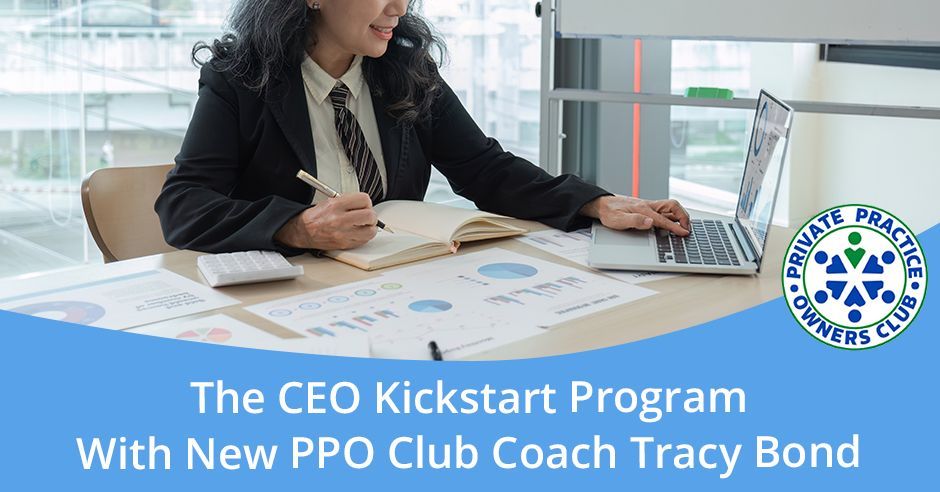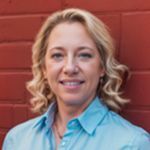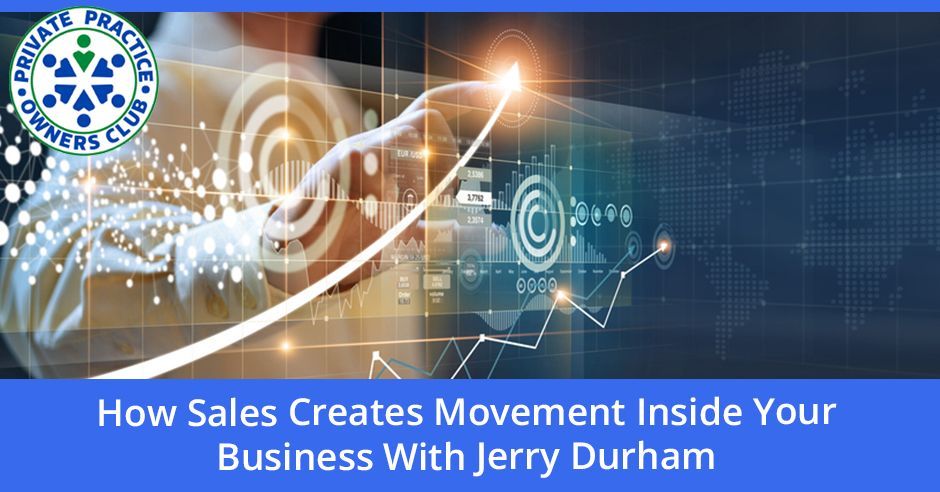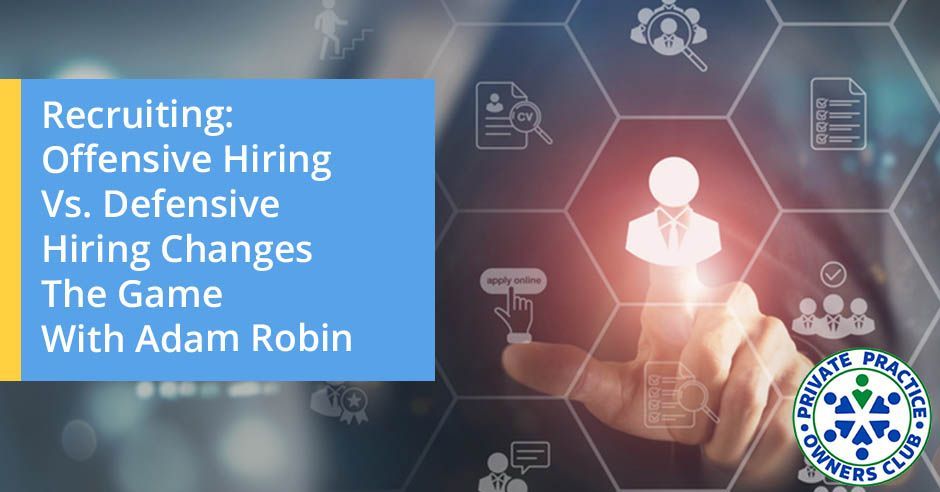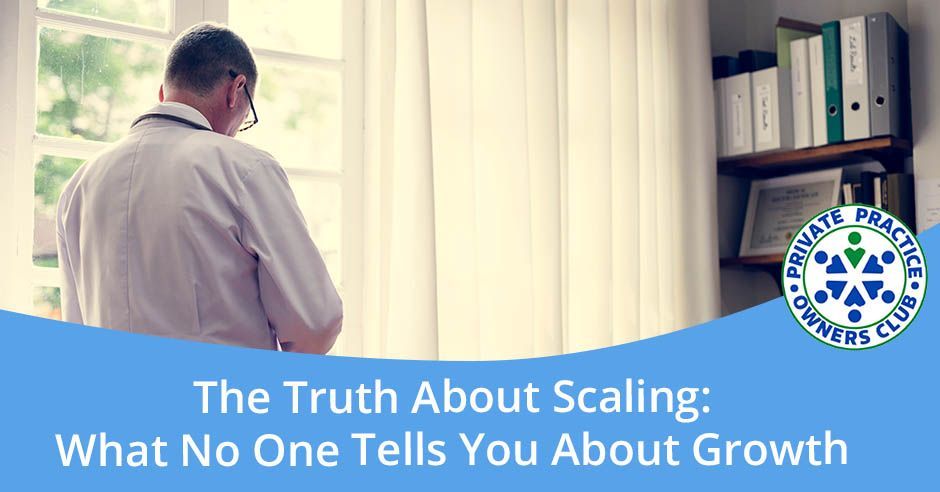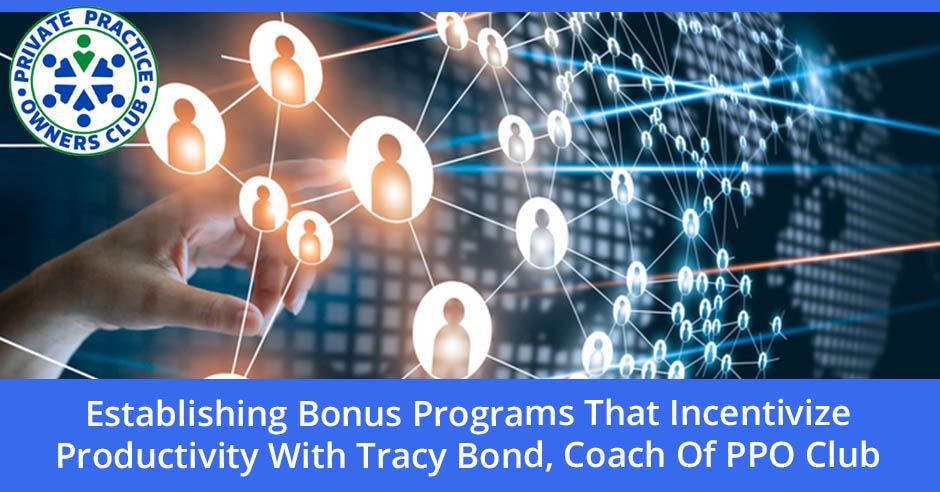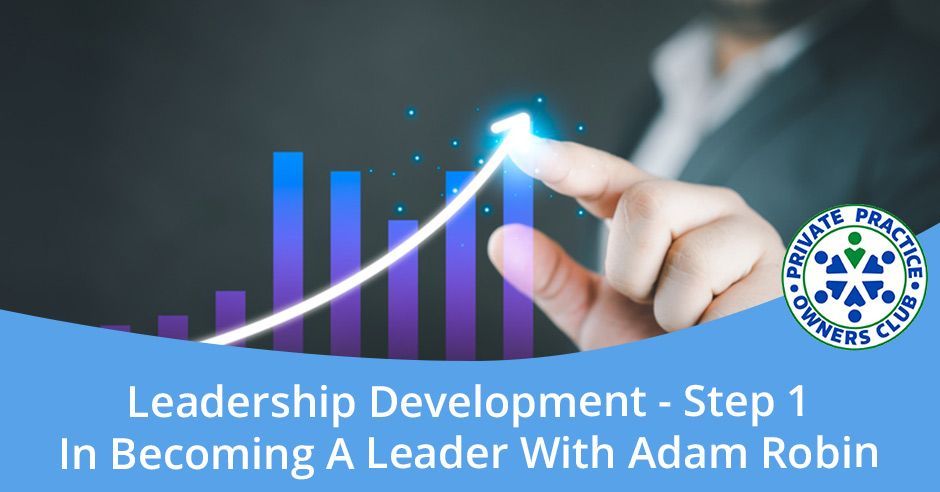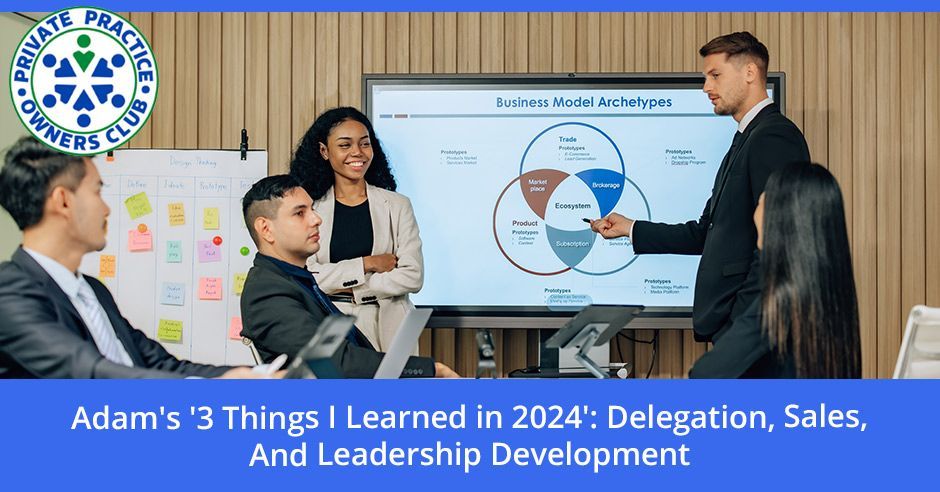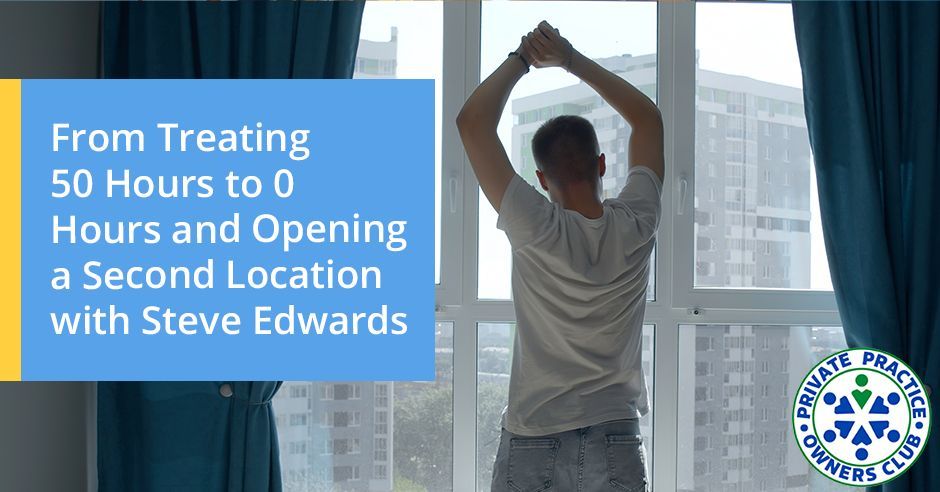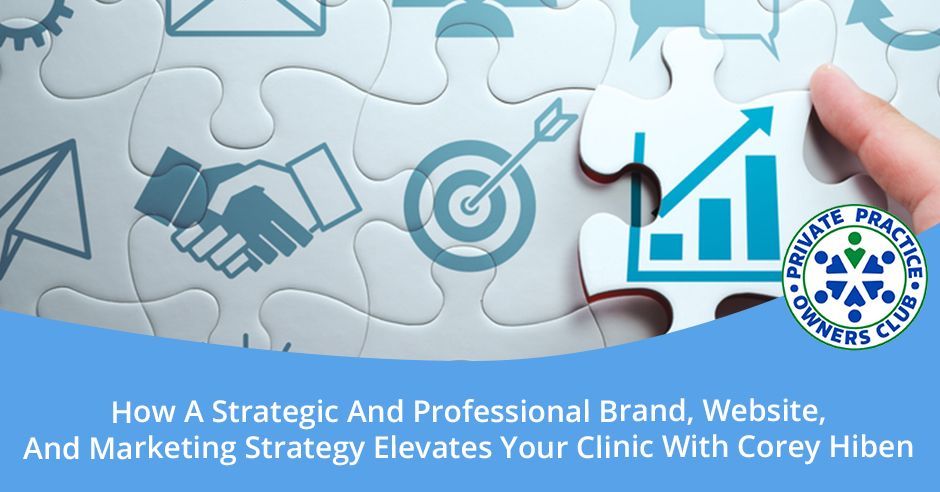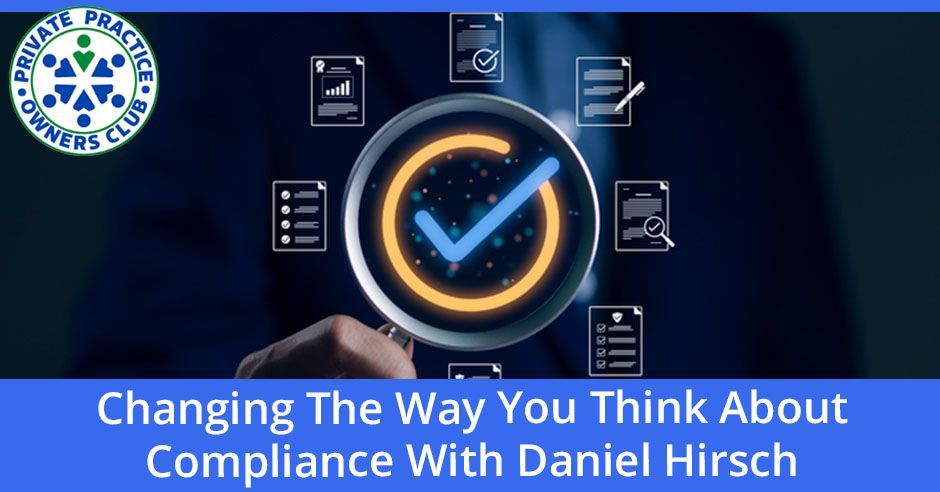Ever wondered how to grow your Private Practice from the ground up – especially during tough times?
Tracy Bond shares how she turned her Practice from a small setup into a thriving business.
In this episode of the Private Practice Owners Club Podcast, Adam Robin welcomes Tracy Bond, an inspiring Private Practice owner and speech pathologist who has scaled her Practice with incredible success. Tracy shares her journey, struggles, and valuable lessons from running multiple Practices.
Episode Highlights:
● Tracy’s incredible story from no prior business experience to learning everything on the go.
● How a clear vision and entrepreneurial mindset is essential to building a successful Practice.
● Why being both a “go-getter” and constant learner is vital for Practice owners.
● Actionable tips to maintain your Practice’s financial health.
Don't miss "The CEO Kickstart Program with New PPO Club Coach Tracy Bond" – whether you're just starting or thinking about your next step in scaling your practice, this episode is packed with wisdom on financial health, growth, and actionable tips for your Private Practice.
Want to talk about how we can help you with your private practice, or have a question you want to ask? Book a call with Adam -
https://calendly.com/adamrobin/dr-adam-s-30-minute-connection
Love the show? Subscribe, rate, review, and share!
https://ppoclub.com/
---
Listen to the podcast here
The CEO Kickstart Program With New PPO Club Coach Tracy Bond
Welcome to the show. My name is Adam Robin. I’m your host today. I have a special guest. This is a new guest, somebody you might not have ever heard of. Before I introduce her, I want to tell you a quick story. For those of you who do not know, I'm a physical therapist. I am super passionate about pouring into people and helping people see new possibilities for themselves.
A few years ago, I partnered up with Nathan Shields. We decided to rebuild the coaching program. Through that process, I've learned a ton. I've worked with so many practice owners. I've built relationships with many of you. I started a program called the CEO Accelerator Program. It's there to help owners build a practice that generates $1.2 million, and that's prepared to scale. Through that process, I've learned a ton. I've met some startups. I've met some amazing practice owners, whether it be PTs, OTs, or speech therapists.
What we have found is that we weren't serving the startups and the smaller practice owners as well as we wanted to. Those are the newbies who don't know where to start. They don't have the resources. They don't have the education to get started and feel confident and excited about their practice. It's usually riddled with a little bit more fear and anxiety than it should be. Nathan and I went on a mission to find somebody, an amazing human being, who could help us build a program specifically to serve those practice owners. We found her. Her name is Tracy Bond. Our guest is our new PPO Coach,
Ms. Tracy Bond. How are you doing, Tracy?
I’m great. How are you? I’m glad to be here. I’m glad to be part of PPOC and to meet lots of people.
I'm super grateful to have you here. The best place to start is who you are and what your story is. I thought my story was cool. Your story is amazing. Before you start, to prep everybody, Tracy is a killer. That's how I introduced everybody to Tracy. She's a killer. She has scaled her practice super quickly. She is radically committed to a scary vision. She's passionate about helping practice owners. In this episode, we're going to dig into her brain and figure out how she thinks and why she's so passionate about it. Tell us who you are, where you're from, and how you got started.
Meet Tracy Bond
I am a practice owner and I've been a speech pathologist for 32 years. I’ve done pretty much every gamut of speech pathology that you can do other than acute care. I've done everything and never had a private practice on my radar. I accidentally fell into it. I had started a contract business for schools. I do pediatrics, but a business is a business and clinics are clinics. It all works the same as far as business principles.
I started a company doing school contracts and ended up having to hire two other speech pathologists to help me because it was such a need in my area. While I was doing that, I helped a friend of mine start her speech program in her OT clinic. She said, “You need to start a private practice.” I said, “No way. I don't know anything about private practice, hiring therapists, hiring staff, business, billing, and all of that stuff that you have to know.” She said, “I think you've got what it takes.”
Nine months later, I opened my first clinic in December of ‘19, which was perfect timing to close three months later for COVID. After COVID, we exploded. We started with OT and speech only. I never had PT on my radar. When we opened back up from COVID, I had so many parents and so many physicians reaching out saying, “We need you to do PT too.” We added PT after we opened back up for COVID.
When I opened, I had four staff members. Two of them were in the schools doing the contracts. I was working full-time, 20 to 30 hours a week, and I was doing treatment the whole time. I had planned to have this one 3,000-square foot clinic for the rest of my life and everything would be great, and that was my retirement plan. It didn't end up that way. My mission and vision was to grow to help as many children in my facilities as I possibly could while also helping their families.
I started this clinic, and everything was going great. We were helping more kids. I kept having to hire more therapists. I don't like a waiting list. When somebody gets about 70% capacity, I hire the next therapist. We opened our second clinic in June of ‘21. It was five and a half hours away from my first clinic. That was a challenge in itself, but we overcame that. We opened our third clinic in June of ‘22.
By ‘22, we had three clinics and we're up and going. We continue to grow with those three clinics. We're now up to 65 employees. We have grown exponentially. We did take a break in 2023 from opening clinics. We haven't opened one in 2024, but we're working on those. We plan to open two more in 2025 and hire lots more staff. That's my story.
Where are your clinics located?
I have two around the Huntsville, Alabama area, and I have one in Gulf Shores, Alabama.
That's incredible. One thing that you mentioned is somebody told you, “You've got what it takes.” Somebody saw a possibility in you, which is awesome. It gets me fired up. What I want to know is what you feel like that is. What do you feel it takes to do that? What do you feel like it takes to be successful?
The mindset is the first thing. You have to have that entrepreneurial mindset, and you have to be a go-getter. The biggest thing is a vision. You have to have a vision and know what you want from your company, your staff, and yourself. Once you have that vision, which comes from experience, and you've worked in these settings, you know what you want to do and you know what you want to accomplish with this business. That's part of it.
You have to have excitement and a passion for what you do and how you do it and be willing to work hard to get it. Those were the main things I felt confident in learning because as I was going through this process with her starting the speech department in her clinic, I was learning and growing from that. That's what she saw in me. It was the fact that I was able to learn, grow, and begin to understand those business principles.
From Go-Getter To Go-Taker
You mentioned a few things there, but I wrote down four. Number one is a go-getter. I like the idea of being a go-taker.
That's a good point.
You take what you want and take what you deserve in an ethical and compassionate way. One of the things that I love about our profession, and when I say profession, I mean rehab profession in PT, OT, and speech, is our desire to pour in others. We love people. It's self-sacrificing. We will do anything to help other people feel comfortable, heard, and seen.
Where I see some people struggle is that they forget about themselves. It's like, “I deserve to be heard and seen. What I want and what I need is important too.” The owners that I talk to that I see struggle with typically have that imbalance. They put the needs of the patient and the team before or way up on a pedestal above the needs of the owner and the business.
I'm guilty of that.
Me too, for a long time.
That's the therapist's heart that we have. We have a therapist's heart before we have a business mind.
We have a therapist's heart before we have a business mind.
That's right, and that's okay. There are a lot of possibilities that can be gained there, but there are also a lot of limitations there as well. What I recognize is the owners who do well with us in our program and the ones that I coach, and I know that you and I probably coach a little bit differently, are the ones who decide that the owner’s needs and the business needs are as important and that we need to pull that need up on equal playing fields as the patients and the team.
It's not the idea of, “I need to take from my patients and my team for the business to win.” It's, “I need to match that intensity. I need to keep serving my patients and my team at a maximum level, but I also need to bring the needs of the business up with it.” The ones that do that, create that mindset and that framework and buy into that, and get their team brought into that idea typically do well. The idea of being a go-getter and then the idea of having a compelling vision, something that excites you and something that brings passion, I would assume that you didn't start off with that type of vision.
Not at all.
You were like, “I'm going to get a clinic going.” Do you know what I mean?
Yeah. It's like, “I’ll open one 3,000-square-foot clinic with OT and speech.”
You were like, “Day one, I'm going to show up with my pen and my paper, I'm going to start asking questions, and I'm going to figure it out.”
It is very time-consuming without somebody to help you do that.
You developed a compelling vision through experience, time, and that challenge. The other thing that you said was learning. The other thing that I see that separates great entrepreneurs from those who repeat the same year over and over is this idea of learning. I don't know if you follow Alex Hormozi. He is this very straight-to-the-point business mind. It’s this refreshing “Shut up and do it” kind of a thing.
The way he describes learning is like, “If I show you a red card and I slap you in the face, and then I show you another red card and you don't duck and I slap you in the face again, you didn't learn.” The ones that learn are the ones that see the red card and they're like, “I need to duck.” They're good at stepping out of the chaos, debriefing their experience, recognizing when they're losing, and then deciding, “Maybe something needs to change here.” The habits that they have, what they’re spending their time on, the people they’re hanging out with, and where they’re investing their energy typically change frequently because they're learning lessons.
That's hard because a lot of people don't adjust well to change. That's something that a business owner has to be able to do. They have to be able to adjust to change not only themselves but also train their staff and their leadership teams to be able to handle those changes as well.
A lot of people don't adjust well to change. That's something that a business owner has to be able to do.
You learned a ton. Learning doesn't always mean reading a book. Learning means getting out there, doing it, messing it up, fluffing it up, failing, getting back up, doing it again, and doing it differently, right? You are willing to do the uncomfortable thing, fail, get up, and keep going. You should be doing that daily, not once a year to learn a lesson. Once a day, learn something great. Fail at something, learn, fix it, and get better.
It's always ever-evolving.
I'm sure you've had this experience. You and I are wired similarly. I've had my team complain to me at times and be like, “Adam, it's too much change. Every day, there's a new idea or a new thing that we're implementing.” It's like, “It’s because I'm learning. Get off this train. I'm learning. You’re coming with me. Let's go.” That's some of the characteristics that I see in owners that take off.
That's part of being a visionary. I have the same problem. Luckily. I have an administrator who says, “Tracy, slow down. We can't overwhelm all of these people. We can't turn out these fifteen changes in one day. We have to do it in gradient.” Somebody has to check on me sometimes.
Most people have a hard time matching your passion, your intensity, and your desire to want to go. That's how you learn to balance that with your team. Your recipe is being a go-getter, having that compelling vision, having a passion for what you're doing, and being willing to learn. Some of those synonyms for learning are failing, doing hard things, getting beat up and punched in the face, and all those things.
It is also learning how to overcome all those things.
That's right. I want to talk about that if you don't mind.
Not at all.
Charging Copays
I had this chat with a young practice owner earlier. You get those questions of, “Adam, have you ever had patients be upset with you if you stand your ground and charge them copays?” There's some fear behind that.
At times, we have. That's a front desk issue too. It's training. You have to make sure that the patients know that's an expectation upfront. We do patient onboarding for all of our new patients, and that's part of the onboarding. They have that policy. They are explained to how that policy works and why it works. If we're not getting those copays, deductibles, or co-insurance, if we're not getting that money in, we can't continue to function. We are there to provide services, but we also have to get paid for our services.
The front desk is something else that takes a lot of training. It's hard to ask people for money. Nobody likes to do that. They have to understand why you're doing that and how important it is to get all of those in. Our biggest thing was making sure that everybody who walked in paid their copay, deductible, and co-insurance regardless of the situation. My front desk is required to have 100% each day for each patient that comes in the door. We've done that in a few different ways. It has been very helpful. The patients and the staff understand it because that's the expectation upfront.
There's a lot to unpack there. I wrote down two things. Number one, you said, “If we don't get paid, we can't function. You also said something to the effect of, “We have to serve our patients, but we also have to get paid for it too.” I'm going to rewind it a little bit. What you did was you took your patients and you brought your business up with it. You said, “The business is important too.”
Only once you establish that belief system and that mindset are you able to enroll your team behind it and build training around it. I wasn't like that when I first started. I was the same way. If it was a $5 copay, I was like, “I’m not charging it because I ain't losing this patient. I need this patient so badly.” I would self-sacrifice. I was like, “I'll work on the weekends if I have to.”
That comes down to the therapist's heart too. A perfect story there is when I started thinking about doing this and told my husband, “I want to open a private practice,” he looked me in the eyes and said, “Tracy, you have a therapist's heart. I know what you think. We have to make enough money to pay the bills and to pay salaries.” I was like, “Okay then if that's a requirement.”
That's exactly what it was. You hate to ask them for money, but does a physician's office hate to ask for money when they walk into a physician's office? We're healthcare professionals like a physician. They should have those same expectations when they come into our clinic for therapy as they do going into a physician's office.
Mindset Shift
It took some work for you to get there. It’s the same for me. Over time, you shifted your belief to think, “I'm going to take a stand for this. I don't care if it's scary. I got to put the business right there in the mix.” What were some of the things that you can lean on like, “These are the top one, two, and three things that helped me change my mindset to step into that place of power and boldness around my business.” What were some of those things that come to mind through your journey?
Once the thing was a financial situation, I started looking at this and I was like, “This is what we're making. This is our revenue if we were collecting 100% of those copays and billing insurance. It was so significant. That's what helped my business, realizing where we needed to have that money coming in and why we needed to have that money coming in. If it's not coming in, we close the doors and we can't help anybody.
It was realizing that looking at the bottom line, you don't have a choice. This is something that you have to do. It's non-negotiable. That's how my staff is trained. I explain the same things to them. I’m like, “If they respect physicians, they need to respect us too. We can't help anybody if we don't have the money coming in from every source we can. Lord knows we don't get the reimbursement that we deserve. Every penny that we can, we need to make sure it's coming in the door.”
I love what you said there. Number one, you said you started objectively measuring things. For me, before that, I was experiencing a lot of pain. There were a lot of long hours and overwhelmed. It was work and not finding the freedom and the fulfillment that I wanted out of my business. I went through that for a year, and then I was like, “No.” One of my coaches helped me say, “We're going to step out of this emotional decision-making process and we're going to step into the land of objectivity. We have to start measuring what matters inside the business.”
That practice gave you a lot more clarity of, “1 plus 1 equals 2. It doesn't equal 2 if I'm feeling good that day.” I have recommitted myself and our program to the idea that we're going to put metrics first. It’s not necessarily before the patients or anything, but the metrics matter. We can't stay in the emotional world. We have to be objective about our decisions. Getting objective was something that helped you start to open your eyes.
More than you can even imagine. We use so many statistics to be able to look at every single aspect of our company. We are able to analyze those and see where we may be falling short, or if we have a statistics tank for one month, “What happened that we need to change? We need to go back and we need to do something that we were doing before or add something to whatever we're doing currently.”
We also look at those wins. When we have those wins and those great months, we also analyze, “What were we doing this month that made those numbers go up? Let's continue to do that consistently and then see what we can do on top of that to make those numbers go up even more.” I didn't know that. I'm a therapist. I am not a numbers person. I was not a business. I was managing my company by the dollar signs. I manage my company by looking at my bank statement.
At the end of every month.
It was working but I wasn't growing. I was just getting by. That is even more stressful, knowing, “If something happens and I don't get that payment from Blue Cross Blue Shield this year, this month, or this week, how am I going to make payroll?” I had to step back, look at it more objectively, and say, “I have to do this. There are no ifs and buts. I have to look at all of these measures.”
My statistics have grown so much since I started. I started with, “This is a set of statistics that I want to look at. I want to look at these daily, weekly, monthly, quarterly, or annually.” Over the years, it has grown from 10 statistics to 100 statistics. That's a gradient that you have to think about too because if you get all of those stats going at one time, it's so overwhelming to have to analyze all that. You have to start somewhere and then gradually increase those based on the needs of your company.
I love it. Building objectivity is key. It goes back to learning. When you can see the scoreboard, you can decide, “Are we winning? Why are we winning?” or “Are we losing? Why are we losing?” It gives you more objectivity around what you can fix. The other thing that you mentioned was this idea of non-negotiable. I'm going to get on that for a little bit because that's important.
You use the word non-negotiable. I use the word commitment. Commitment to me means the absence of alternatives. There are no alternatives. I believe that owners who are radically committed to their principles typically do well. They’re like, “There is no alternative. I'm going to get it done. Even if it's scary and I mess it up, I'm going to learn.” That's great.
Your staff needs to know it's okay to mess up. I have several leadership positions. I wouldn't have put them in those positions if I didn't trust them. It’s the same thing with the therapist. I wouldn't put them in that position if I didn't trust them to do their job. They don't need me micromanaging. Their biggest need is those very clear expectations from the beginning. What does your commitment look like? What is non-negotiable in your specific role?
Your staff needs to know it's okay to mess up.
The other phrase I like to use is something along the lines of, “There isn't a reality that exists where this isn't going to happen. Either the copay is getting paid or we're going to find somebody else who's willing to pay the copay. This is not negotiable.”
It could also be to find somebody willing to collect those copays.
Exactly. That's not mean. That doesn't mean we don't want to serve more than they've ever been served. We also have to hold the line. The business is important too. Objectivity was a big thing that helped you start making progress. Is there anything else that comes to mind?
The Value Of Training
You'll hear me say this 100 times, but training. It is making sure your staff knows exactly what you expect from them. If you find somebody who's not doing what they need to be doing or not living up to your expectations, I have found that many times that falls on me or my leadership team. Maybe we haven't taught them the why. People like to know, “Why do I have to do this?”
I haven't done therapy in a long time. I stopped doing treatment about eight months into the practice because I didn't have time. Since I'm not at that point in my career anymore, if I create a policy or a procedure or look at an EMR or any of those things that are related to therapists, for example, then I may create that, but they may look at it and go, “This makes no sense. Why did you do this? This does not work for us.” Also, have that open communication that they come back and say, “This isn't working.” The thing is I also have to ask them why. I'll be like, “Why is this not working? What is your solution to this problem? Let's talk through some solutions.”
Does it mean that I'm always going to go with exactly what they recommended? No, because they don't have the business mind that they need to run a business, but it's important to take them into consideration because they are doing these things on a daily basis. It is to make sure that they have some input in some of those changes that are being made because I know I'm not an expert in their field anymore and they're not an expert as a business owner. We have to draw a line somewhere and be able to negotiate those things.
I love that idea of training. I would think that we can agree that it starts with training yourself first.
I will go to the end saying, “Thank goodness for good coaches,” because that's exactly what has gotten me to where I am.
I feel the same. Let's dive into training a little bit. I did a lecture on leadership not too long ago. We talked about the idea of creating this belief system around your business being as important as the patients and your team. I use the word belief system intentionally because there are only two ways to change your beliefs. Number one is the information that you consume or the education that you receive. We're talking about books, podcasts, or whatever way you'd like to consume information.
Networking.
Exactly. The other thing is going to be what people tell you. It is the information that you receive and what people tell you. If we understand that, the belief system that we hold will determine the outcomes of your business. If I believe I can take a stand for it, I can create training around it, I can create clarity around it, and I can train my team, the way to do that is to, number one, consume quality information regularly. Those could be from education, books, podcasts, and hanging around people who challenge the way that you believe and challenge the way that you think.
Show me your friends and I'll show you your future. If you want to be a millionaire, you have to hang out with millionaires. It is having a guide, a mentor, or a coach who's been there, who's gone through that pain dip, and who can be like, “Let me tell you how to overcome that,” and also hold you accountable to stay true to the things that you say you're going to commit to.
We help them problem-solve like we want to help our staff problem-solve.
If you say, “I'm going to build this environment around me and plug into it. I'm going to commit to it. It's non-negotiable,” it's impossible for you not to succeed.
I agree.
Coaching and reading changed my life. That's why I became a coach.
That's what I love about it too.
Talk to me about that. Tell me about how coaching has changed your life and how you developed such a passion for it.
My passion came from doing what I was doing. That education piece, I could learn it on my own, and I did for eight months but it was always the chicken and egg scenario. What comes first, the chicken or the egg? That was especially true when I started opening a business. I was like, “What do I do first? Do I create an LLC? Do I get an EIN? Do I get an MPI?” Trying to figure out what comes first and what should come next was one big piece.
The other thing with my coach was they didn't necessarily tell me, “These are the things you need to do.” They said, “Let's look at your weaknesses. What do you feel like you're weak in?” We would talk about a weakness. They then would say, “Do you have a strength that you could put toward that weakness? Let's talk about that. Now, based on this information and all this data you have, whatever the data is, what do you think you can do to improve the situation?” They led me to water but I had to drink it. It was better for them to teach me how to problem-solve than for them to hand me a solution.
With that, I have done several programs and had several coaches where it would have been detrimental if I didn't have them. It has been a phenomenal experience. That's the reason I want to give back. They helped me get to where I'm at. I want to help others get to that point. That's such a passion for me. That's what I love doing. That's what gets me up in the mornings. That's what makes me excited. Necessarily, I'm not in the clinics as much as I was. That's the reason that gives me time to do that strategic planning and teach other people how to do that strategic planning so that they can scale their business as they want to.
The Kickstart Program
Tell me about the Kickstart Program.
The Kickstart Program is new. It is for those people who are looking to open a clinic in 3 to six 6 months. We can help them get organized, get into the groove, figure out the chicken and egg scenario, and help them do that. It's also for those who have started their business. We need some organization, need some structure, need to figure out where they're going with their organization and plan to go in that direction based on their vision, mission, and core values. That's important as well. It's to get people over some of those hurdles and decrease that pain.
It's very important for them to know you're not on an island. We have all been there. If you think that you're the only one who has had $10 in the bank and you need $11, you're not the only one. We've all been there. We've all struggled through that. That's what the Kickstart Program is for. It's to help you struggle less. We all have our trials and tribulations. That's the name of the game. If there's somebody there that can help you struggle less and help you with that problem-solving, that's huge. The Kickstart Program does that.
We do a lot of networking. I mentioned networking a few minutes ago. It's important to be around those people who are sharing the same things you are and to see, “They've done this but they've overcome it. They can share how they've overcome that.” It is bouncing ideas off of each other and having that networking component in addition to coaching and getting it from a coach who may be, in my case, five years into the company business world versus those who have gone through it a month or two ago. The group calls are great. I would encourage everybody to find those friends that you can reach out to on any of our platforms. Pick up the phone and give them a call. Talk through a scenario. Make sure you develop those relationships with your coach and with other people.
I have some more questions about that program. From what I experienced, what happened was we had our Accelerator program built but we had Kickstart people in it. There was an obvious gap. There was a gap between, “How do I get started?” and, “How do I make $1 million a year?” It's a different stage of business. Some of the common questions were like, “How do I market to physicians? How do I build a marketing plan? How do I do credentialing? How do we handle billing? How do we do referral management? How do we have a team meeting?”
Those are the things that you learn the hard way if you don't have somebody to help you through them.
That's right. It’s like, “How do I get started? How do I get this place open and get some patients in the door?” What I typically see in that stage is a lack of implementation because the education level is so low in the owner. They're newbies. They don't know anything. They don't have the experience to draw from. The decision-making speed is so slow, so it's so hard to make traction.
Lack of education leads to overwhelm.
That’s correct. You end up getting massively overwhelmed, your head way below water, and spending way more time, energy, and money trying to get a practice started when you could make the decision and roll. I was listening to a talk that Jeff Bezos did. He's got an amazing company. I think he's got 1,000 employees or 1,500 employees. I don't know what he’s got but it’s more than me. He said, “We have so many people on our team but we're still fast. We still make quick, rapid decisions.”
The teams and the entrepreneurs who can get to the decision quickly and implement are typically the people who do well. Instead of sitting around and being like, “Let me ask Tracy. Let me Google it. Let me ask my friend. That didn't work,” instead, they're trying to find that clarity. That's the power that I see in the Kickstart Program. We're empowering these people to be like, “This isn't going to take five years to get profitable. Let's get profitable in three months.”
How many times have you heard people say, “A business is not going to bring in any profit for five years.”
That's bull. I hate that. That's a lie. It's a complete lie.
I also see a lot of business owners or clinic owners who don't take a salary. They're two years in and they're not taking a salary. What are you doing? We have to figure out some way that you're being at least minimally compensated for all the blood, sweat, and tears that you're putting in and all of those hours you're putting in. Let's make a plan around that.
I love that. It’s like, “How do I get the knowledge, experience, and network of somebody who has been in business for 5 years in 6 months?” You’re talking about getting on a rocket ship. You can make a lot of progress. The other thing that I wanted to ask you about, and we talked about it a little bit before we pressed record, is I thought it was beautiful that you've created some flexibility in the price.
If you're going to hire a coach or you're going to jump into the Kickstart Program, it's going to cost some money. It's going to cost some thousands and save you millions. We don't necessarily have to jump into the details of the price, but can you talk through those tiered structures and what tier A, tier B and tier C might look like?
Yeah. We've got three tiers. I think of them as a la carte because we have certain things that we're going to be doing in those. You were talking about that big gap. We want to be able to look at what owners are doing and figure out what exactly they need to help them. Our lowest tier, if you want to call it that, is we do three group calls a month. That is at least for two of them. One of them is optional. I'll talk about that too. We have access to our Slack channel. You've got that direct messaging or instant messaging to everybody who's enrolled in the Slack channel.
I'm creating, and it will be ever-evolving, what we call a Kickstart Vault. That's going to be a lot of great information and great resources for new owners to be able to have examples and templates. Everybody can write a policy or a procedure, but where do you start? Those things are in that vault in addition to, “How do I get motivated? How do I start marketing? How do I get a front desk up and running?” That information is in there. As we have questions about different things, then we'll continue to add to that vault.
The second tier is all of that, the three group meetings, the Slack channel, and Kickstart Vault, and then you have access to my cell phone number. If you need me, shoot me a text or pick up the phone and give me a call. If there's an emergency that you're drowning or your hair's on fire, then get in touch with me. The other thing with that program is there's a one-on-one call with me every month. For an hour, if you need an hour, we’d sit down and talk about what your challenges are, what your wins were for the last month, and then what we need to do over the next month to get that scale growing.
The third one is all of that. Plus, we do four one-on-one calls per month. They're a total of 24 calls that are an hour long. We do some of the same things. We have homework weekly instead of daily. It holds you accountable to, “I'm not going to wait until the third week in the month because I've got a call with Tracy next week. I'm not going to wait three weeks. I'm going to get this done every week.” We want that to help you get organized and look at your time management and how you can pour back into yourself and your business.
We still have the three group calls. With the three group calls, the first one of the month is a book study that I'm calling StarBooks. We'll have a book that we'll read every month, and then we'll have a discussion on that book on the first Wednesday of the month. I’ll send out an agenda so you know for the next 3 months, 4 months, or whatever the books are that we're going to read so you can have those ordered in time. We'll have an agenda and we'll have discussion questions. If you've got something that you specifically want to talk about or specifically want to ask, then we have a form that you can submit. That will help me add all of those things to the agenda so we make sure we cover everything that you want to.
The second one is what I call Education Station. We choose a topic, and this is a topic based on the needs of the group. What are some needs that several people in this group are looking at? If it's time management, then that meeting will be on time management. What are some things that we can do to control our schedules a little bit better? How can we delegate things off of our schedule? The third one is Coach's Corner. That is a question and answer. You would give me the questions you want answered, we'll fit it into the schedule or the agenda, and we'll cover those. You’ll get feedback from me and feedback from others. Ask any questions that you want to have.
We've added an a la carte because some people feel like they need more one-on-one meetings than once a month, but maybe not three times a month, and they want to schedule them when they're needed. We've added that as well. We can do a phone conversation, a Zoom, or whatever as an extra benefit to any of those programs that they choose.
I wrote down fractional business partners. The power of having a therapist who has scaled three clinics, soon to be five, in a matter of five years on your team, to have access to that person, and to be able to tap into her brain, her energy, her resources, her experience, and her network, how are you not going to get value from that? It's worth the investment. That's an investment in yourself. That comes back to that idea in the beginning of investing in that training, coaching, books, podcasts, and community. You are investing in that so that you can empower yourself to build the business that you want.
When I was starting with my coach, I used the excuse, “I don't have time.” I would put off things that I knew needed to be done on the back burner. When I started with my coach and after a year of having a coach, I learned that all of those things I should have done in the beginning, I have to go back and redo or create. I should have blocked off that time. I should have dove in and done those things. I should have created time in my schedule to be able to follow through with all those tasks.
That is so that when you're a year in, you don't go back and go, “I've got so much to do.” Even metrics, going back and looking from the beginning is so overwhelming versus, “I've only been open for three months.” That’s not as big of a deal as, “Let's look back for a year and start putting all that information in some kind of spreadsheet, database, or whatever.”
For owners to pour back into themselves, help them get that business mindset that they need, and help them with organization, time management, and knowing what priorities are upfront will save a lot of time in the future. It saves a lot of time upfront because they don't have to figure out what to do first and there's somebody that can help them navigate those things and how to do them.
It's the investment that keeps on giving. Once you can start a practice, build it successfully, and scale it, that doesn't depend on you. You can do anything. You can start a new program. You could open up another clinic. You could do whatever you want. There are so many skills that you develop there. It's amazing. I do have to run, but I'm going to drop your call booking link into the post. If you're on the show, come over to the Facebook group, find the post, scroll down, and click Book a call with Tracy.
We don't even know if you're right for us. You don't even know if you're right for this. This is an opportunity for us to connect and explore what you want to do. If it's a good fit, we can share more details. If it's not, we can connect you with somebody who might be able to support you. Does that sound fair?
It sounds great to me. I look forward to working with everybody.
If somebody wanted to connect with you for a question without booking a call, how would they connect with you?
They can always email me. I'm obsessed with email, so if I get one, I will probably be emailing you back pretty quickly. Let me know what the best way to get in touch with them is in the email and I'll get back in touch with them.
I will drop Tracy's email in that post as well. You're amazing. Let's do this again.
That sounds great. Bye.
Important Links
About Tracy Bond



